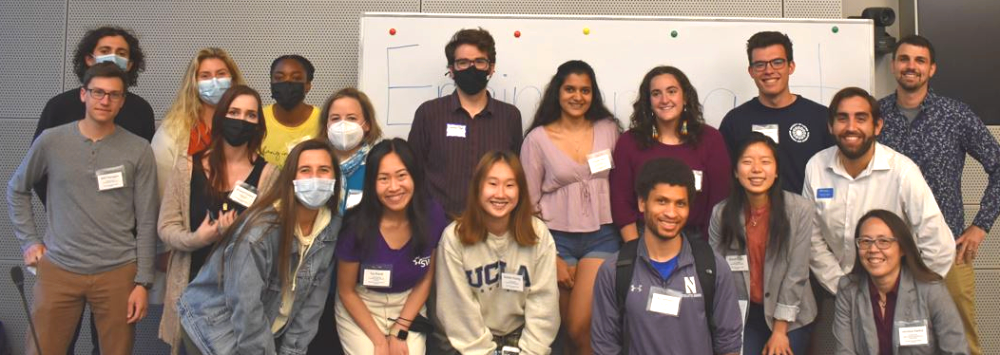
Engineering for Humanity Research Symposium @ UCLA
On Friday, April 15th, five engineering student organizations came together to host their first Engineering for Humanity Research Symposium—a student-centered event focused on highlighting research being done by UCLA engineering faculty members with wide-reaching positive societal impacts. This event was hosted by the Society of Women Engineers (SWE), the Graduate Society of Women Engineers (GradSWE), the American Indian Science and Engineering Society (AISES), the National Society of Black Engineers (NSBE), and the Society of Latinx Engineers and Scientists (SOLES). The featured speakers were Professor Tyler Clites from the Mechanical and Aerospace Engineering Department, Professor Claire Aiello from the Electrical and Computer Engineering Department and Professor Andrea Kasko from the Bioengineering Department.
Q & A with the Leadership Committee
The goals for this event were to introduce students to engineering and display how it can be used to positively impact diversity and human relationships.
Q: What inspired so many different student organizations to come together to plan the Engineering for Humanity Research Symposium?
A: We believed that research exposure should be accessible to all! All of our organizations have a similar mission to increase historically underrepresented students in science and engineering, but most of our efforts aren’t geared towards research. Several of us attended the Amazon Science Day event in fall quarter, where professors from the UCLA Samueli School of Engineering (along with fellows from the UCLA David Geffen School of Medicine and College of Letters and Science) presented their research. That event inspired our leadership to plan a day that all students could attend, and one that was centered around “Engineering for Humanity” to emphasize our collaborative mission of increasing diversity within engineering. We also believed that members in all of our organizations would be interested in an event like this and, by collaborating, we could reach a broader audience.
Q: Why did the committee believe it was important for this event to be open to interested students from across campus?
A: The goals for this event were to introduce students to engineering and display how it can be used to positively impact diversity and human relationships. Because of this mission, we wanted this event to be open to all students across campus. We wanted students to know that research can be for everyone. In our own personal experiences, it sometimes felt like there were limited opportunities for undergraduates to gain research experience and interact with people in research. We often feel major imposter syndrome, as if we are not “cut-out” to do research. By opening up this event to all students across campus, we wanted to break this stereotype and help people see research can be for everyone!
Q: What does the committee hope attendees take away from the event? Are there hopes to hold similar events in the future?
A: Our committee hopes the attendees were excited about the research they heard about, learned about what life in research is like and will be inspired to consider pursuing it. As many of our panelists reiterated, the journey to research is not always linear and we hope that people were encouraged by the realization that their path can lead to research as well.
We also wanted to show people that engineering research is so unique in that it can have a massive positive impact on society. Areas like prosthetics for medical surgery, quantum biology, and polymers are so important for building a better future. Gillian Vaughn—president of the American Indian Science and Engineering Society and member of the committee—offers that one principle in many Native American cultures is the principle of seven generations. This principle suggests that the work we do today should be for our relatives seven generations ahead of us. This principle is inherently woven into the mission of this event—that engineering research for humanity is what makes the world a better place, and we are always seeking solutions to problems to create a better future. We hope this event will be carried on by our team and future committees, because it was a great event and a cool way for our organizations to collaborate!
